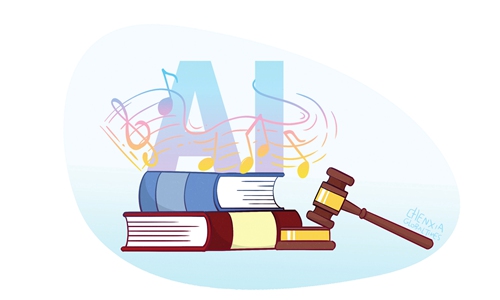
Illustration: Chen Xia/Global Times
Over 200 internationally renowned musicians have jointly penned an open letter, urging AI developers, tech companies, platforms, and digital music service providers to cease the use of AI that infringes upon and diminishes the rights of human artists.
Their specific demands include discontinuing the use of AI to infringe upon or degrade the rights of human artists, requesting commitments to refrain from developing AI music generation technologies related to such actions, and ensuring fair compensation for artists.
The artists are predominantly from the European and US music scenes and include Stevie Wonder, Robert Smith, Billie Eilish, Katy Perry, Nicki Minaj, Smokey Robinson and more.
The letter underscores the specific methods of AI infringement, including deepfakes and voice cloning, as well as the irresponsible use of AI, such as reducing royalties to artists by employing AI voices and using musical works without permission to train and produce AI replicas.
Indeed, the issue of copyright infringement in the music industry has caused concerns in many countries, including China. In 2023, Singaporean singer Stefanie Sun dominated trending lists on Chinese social media after users uploaded AI-generated songs that used her voice. AI versions of Jay Chou and JJ Lin also emerged, which later stirred the heated discussion of creators being sued for sampling other artists' work without permission.
Compared to the grassroots use of AI technology, the shockwaves caused by AI music generation software developed by major corporations are even more significant.
In the US, tech giants like YouTube have begun testing AI music production tools. Recently, the AI music generation software Suno released its V3 version and made it available to users for free. Users can generate songs about two minutes in length simply by providing basic text prompts, freely choosing music styles like psychedelic or heavy metal, as well as selecting male or female vocals and lyrics. The resulting music includes lyrics, preludes, interludes, and choruses, nearly indistinguishable from human-made compositions. It is reported that Suno once received nearly 10 million visits in one week. Suno's premium members can generate up to 2,000 songs per month.
China has rapidly followed suit. The domestic AI music generation model "Tiangong SkyMusic" initiated a free invitation test activity and "received hundreds of thousands of test applications in a very short time." It claims to be the first and only publicly available large-scale AI music generation model in China, capable of generating 80-second, 44100Hz sample rate, and two-channel stereo songs.
With the fast development of the AI music generation models, it is understandable that these artists would feel "threatened" by "predatory AI" and sign such an open letter to protect their rights.
The emergence of AI has not only raised concerns in the music industry but also sparked heated debates concerning other art forms such as literature, film and television works. Currently, it appears that the scenario of AI completely replacing genuine art does not exist. Many music insiders have emphasized that AI cannot replace human creativity as music is a manifestation of human artistic creation. Although tools like Suno lower the barrier for music creation, they are unlikely to entirely supplant professional musicians, especially talented ones. The value of music lies not only in melody and rhythm but also in the story, emotion, and artistry behind it, elements that current AI technology struggles to replicate fully.
Issues such as ownership of AI-created works, the risk of infringement by AI creations, and attribution of AI creations require focused attention. Sacrificing and infringing upon the legitimate rights of music industry stakeholders to the detriment of the music ecosystem is unacceptable.
Tennessee in the US has become the first state to pass legislation protecting musicians and other artists against AI. The bill will go into effect on July 1. In other regions, authorities need to expedite the formulation of regulations to enhance legal frameworks.
The author is a reporter with the Global Times. life@globaltimes.com.cn




